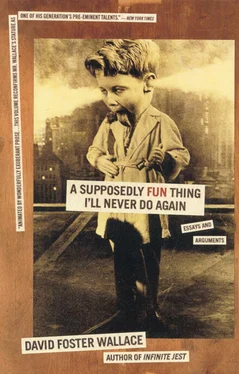Lost Highway will also, I predict, do huge things for the career of Mr. Robert Blake, 33who’s been cast seemingly out of nowhere here as The Mystery Man. The choice of Blake shows in Lynch the same sort of genius for spotting villain-potential that led to his casting Hopper as Frank Booth in Blue Velvet and Willem DaFoe as Bobby Peru in Wild at Heart , an ability to detect and resurrect menacing depths in actors who seemed long ago to have lost any depths they’d ever had. 34Gone, in Lost Highway , is the sensitive tough-guy of Baretta and the excruciating self-parody of Blake’s stoned appearances on The Tonight Show ; it’s like Lynch has somehow reawakened the venomous charisma that made Blake’s 1967 performance in In Cold Blood such a sphincter-loosener. Blake’s Mystery Man is less over-the-top than was Frank Booth: The M.M. is himself velvety, almost effete, more reminiscent of Dean Stockwell’s horrific cameo than of Hopper’s tour de force. Blake is also here virtually unrecognizable as the steroidic cop who said things like “Dat’s the name of dat tune” on ’70s TV. Lynch has him many pounds lighter, hair shorn, creamed and powdered to a scotophilic pallor that makes him look both ravaged and Satanic — Blake here looks like a cross between the Klaus Kinski of Nosferatu and Ray Walston on some monstrous dose of PCP.
The most controversial bit of casting in Lost Highway is going to be Richard Pryor as Balthazar Getty’s boss at the auto shop. Meaning Richard Pryor as in the Richard Pryor who’s got the multiple sclerosis that’s stripped him of 75 pounds and affects his speech and causes his eyes to bulge and makes him seem like a cruel child’s parody of a damaged person. In Lost Highway , Richard Pryor’s infirmity is meant to be grotesque and to jar against all our old memories of the “real” Pryor. Pryor’s scenes are the parts of Lost Highway where I like David Lynch least: Pryor’s painful to watch, and not painful in a good way or a way that has anything to do with the business of the movie, and I can’t help thinking that Lynch is exploiting Pryor the same way John Waters likes to exploit Patricia Hearst, i.e. letting the actor think he’s been hired to act when he’s really been hired to be a spectacle, an arch joke for the audience to congratulate themselves on getting. And yet at the same time Pryor’s symbolically perfect in this movie, in a way: the dissonance between the palsied husk on-screen and the vibrant man in our memory means that what we see in Lost Highway both is and is not the “real” Richard Pryor. His casting is thematically intriguing, then, but coldly, meanly so, and watching his scenes I again felt that I admired Lynch as an artist and from a distance but would have no wish to hang out in his trailer or be his friend.
15 addendum to (14) re Lynch and race
Except now for Richard Pryor, has there ever been even like one black person in a David Lynch movie? 35There’ve been plenty of dwarves and amputees and spastics and psychotics, but have there been any other, more shall we say culturally significant minorities? Latins? Hasidim? Gay people? 36Asian-Americans?… There was that sultry oriental sawmill owner in Twin Peaks , but her ethnicity was, to say the least, overshadowed by her sultriness. 37
I.e. why are Lynch’s movies all so white?
The likely answer involves the fact that Lynch’s movies are essentially apolitical. Let’s face it: get white people and black people together on the screen and there’s going to be an automatic political voltage. Ethnic and cultural and political tensions. And Lynch’s films are in no way about ethnic or cultural or political tensions. The films are all about tensions, but these tensions are always in and between individuals. There are, in Lynch’s movies, no real groups or associations. There are sometimes alliances, but these are alliances based on shared obsessions. Lynch’s characters are essentially alone (Alone): they’re alienated from pretty much everything except the particular obsessions they’ve developed to help ease their alienation (… or is their alienation in fact a consequence of their obsessions? and does Lynch really hold an obsession or fantasy or fetish to be any kind of true anodyne for human alienation? does the average fetishist have any kind of actual relationship with the fetish?) Anyway, this kind of stuff is Lynch’s movies’ only real politics, viz. the primal politics of Self/Exterior and Id/Object. It’s a politics all about religions, darknesses, but for Lynch these have nothing to do with testaments or skin.
interconnected trivia tidbits : what kind of car Patricia Arquette has, whom she’s married to, etc.
Patricia Arquette owns a brand-new maroon Porsche, which Porsche must be very special to her because she seems to be in the freaking thing all the time, even driving it the 200 feet between her trailer and the set in Griffith Park, so that the crew always has to move carts full of equipment out of the way to let her pass, yelling at one another to be careful of Patricia Arquette’s beautiful car’s paint job. Plus Arquette always has her stand-in with her in the car — they’re apparently close friends and go everyplace together in the maroon Porsche, from a distance looking eerily identical. Patricia Arquette’s husband is Mr. Nicolas Cage, who worked with Lynch on both Wild at Heart and the video of Industrial Symphony #1 .
16 Patricia Arquette’s description of the central challenge for Bill Pullman and Balthazar Getty w/r/t the “motivation” of Lost Highway ’s metamorphosing protagonist (whose name when he’s Bill Pullman is “Fred” and when he’s Balthazar Getty is “Pete”)
“The question for Bill and Balthazar is what kind of woman-hater is Fred [-dash-Pete]? Is he the kind of woman-hater who goes out with a woman and fucks her and then never calls her again, or is he the kind who goes out with a woman and fucks her and then kills her? And the real question to explore is: how different are these kinds?”
11a why what David Lynch wants from you might be a good thing
If you will keep in mind the outrageous kinds of moral manipulation we suffer at the hands of most contemporary directors, 38it will be easier to convince you that something in Lynch’s own clinically detached filmmaking is not only refreshing but redemptive. It’s not that Lynch is somehow “above” being manipulative; it’s more like he’s just not interested. Lynch’s movies are about images and stories in his head that he wants to see made external and complexly real. (His most illuminating statement about the making of Eraserhead involves “the exhilaration he felt standing in the set of Mr. and Mrs. X’s apartment and realizing that what he had pictured in his mind had been exactly recreated”).
It’s already been observed that Lynch brings to his art the sensibility of a very bright child immersed in the minutiae of his own fantasies. This kind of approach has disadvantages: his films are not especially sophisticated or intelligent; there is little critical judgment or quality-control-type checks on ideas that do not work; things tend to be hit-or-miss. Plus the films are, like a fantasy-prone little kid, self-involved to an extent that’s pretty much solipsistic. Hence their coldness. 39
But part of the involution and coldness derives from the fact that David Lynch seems truly to possess the capacity for detachment from response that most artists only pay lip-service to: he does pretty much what he wants and appears not to give much of a shit whether you like it or even get it. His loyalties are fierce and passionate and almost entirely to himself.
Читать дальше












